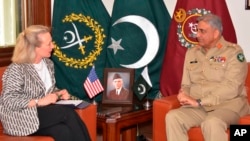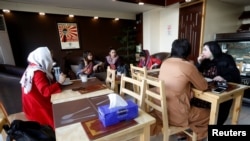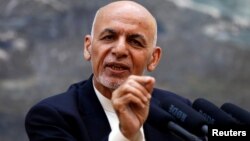A senior American diplomat has again criticized Pakistan for its inability to translate promises into action against various terror and extremist groups operating from Pakistani soil.
Alice Wells, principal deputy assistant secretary for the Bureau of South and Central Asian Affairs, spoke to a group of reporters Thursday in a roundtable discussion at the U.S. State Department about her recent trip to Islamabad.
Wells praised Pakistan's efforts to improve bilateral relations with neighboring Afghanistan, but stressed that Pakistan should take "sustained and decisive" action against the Afghan Taliban.
"There have been positive steps taking place in the bilateral, you know, improving Afghan-Pakistani relations, which is important. It is a critical part of ultimately what is going to be a reconciliation process," Wells said.
"What we are looking for are the sustained and decisive steps taken to persuade the Taliban leadership to come to the negotiation and it is that absence of sustained and decisive steps that led the president [Trump] in January to suspended military assistance (to Pakistan)," Wells added.
Last year, while announcing his new South Asia strategy, U.S. President Donald Trump put Pakistan on notice for failing to do more against terror safe havens in the county.
The first tweet this year from the U.S. president was about Pakistan.
Pakistan's reaction
Pakistan has publicly supported Afghanistan's efforts to talk with the Taliban.
But in reaction to Wells' recent comments made during her trip to the region that Pakistan should push the Taliban to come to talks, Mohammad Faisal, Pakistan's foreign ministry spokesperson, said Thursday that Islamabad is not solely responsible for bringing Taliban to the table.
"Absolutely not. We have repeatedly stated that all stakeholders in Afghanistan will have to share this responsibility and Pakistan is ready to play its role in it," Faisal said, speaking at a weekly news conference.
Pakistan says it no longer has the kind of leverage it once had on the Afghan Taliban because the insurgent group has control over large swaths of territory in Afghanistan and operates from there, a claim denied by Kabul and Washington.
"It is absolutely clear that the only stumbling block to a meaningful political negotiations is the Taliban leadership and many of whom reside outside of Afghanistan and thus outside of the pressure of Resolute Support and Afghan national security forces," Wells said, referring to Afghan Taliban leadership councils operating from Pakistan.
South Asia strategy
Wells said President Trump's South Asia strategy is working and has made a difference in the region.
"I think the South Asia strategy is making a difference. Under the South Asia strategy, we are increasing military pressure on the Taliban through the increased capabilities of the Afghan national security forces, in particular their special operators and their aviation assets," Wells said.
"The president's strategy has underscored to the Taliban that we will deny them military victory and there is a commitment to stay," she added.
U.S.-Pakistan relations
Relations between Pakistan and the U.S. have deteriorated over allegations that Taliban insurgents fighting local and international forces in Afghanistan use sanctuaries on Pakistani soil to plan attacks.
Ambassador Wells said it is ultimately up to Pakistan to take the right steps in improving the bilateral relationship between both sides.
"The quality of our relationship is going to depend on the quality of our ability to work together and that's a simple truth," Wells said. "We want Pakistan to succeed and to be a stable democratizing force for regional stability."
U.S. and Afghan officials have long accused Pakistan of being selective in its campaign against militant groups operating in the country. Pakistani officials deny the charges and maintain that the country has equally targeted all militant groups.
Aizaz Ahmad Chaudhry, Pakistan's outgoing ambassador to the United States, told VOA in an interview in May that his country has done the most against terrorism in the region and that no country can accuse it of not doing enough.
"Al-Qaida, if you don't hear about it today, it is because Pakistan and the U.S. were cooperating. Al-Qaida is the organization that caused 9/11, and, therefore, we think that no country can tell us that Pakistan has not done enough. In fact, Pakistan has done the most," Chaudhry said.
Deadlock in peace talks
In February, Afghan President Ashraf Ghani offered unconditional peace talks with the Afghan Taliban and pledged to recognize the insurgent group as a legitimate political party if it agreed to give up violence.
Taliban rejected Ghani's offer and instead showed willingness to talk directly with the U.S.
But Washington has insisted that the talks must be Afghan-led and Afghan-owned.
Taliban's unwillingness to talk with the Afghan government has essentially created a deadlock in the peace process.
But Wells, citing the recent ceasefire in Afghanistan, expressed optimism that Taliban will come to talks.
"You have an international community consensus that the Taliban leadership must engage with the Afghan government. It doesn't mean that they shouldn't engage with us that we wouldn't engage with them in support of a peace process … that's ultimately between the Taliban and the Afghan government," Wells said.
"I think the problem or frustration that (the) international community has is that the Taliban have never put forward empowered leaders to drive political negotiations," she added.
VOA's Madeeha Anwar contributed to this report.






